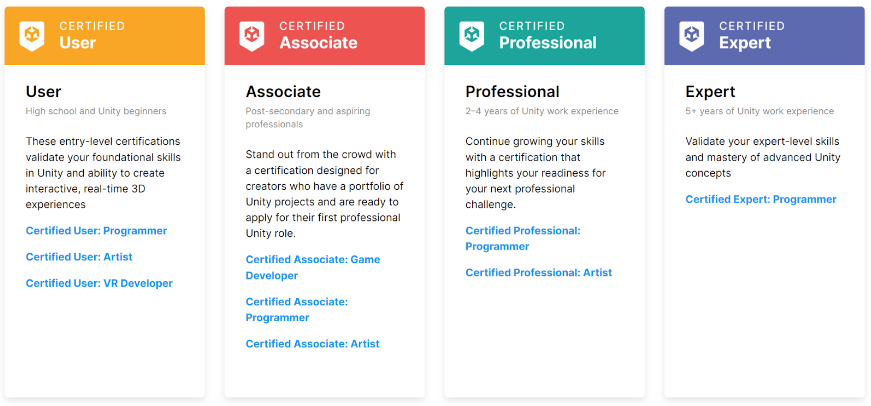Career research and preparation
Tutorial
Beginner
+5XP
25 mins
1696
Unity Technologies

In this tutorial, you’ll research career areas, job titles, and the necessary certifications and qualifications to help you identify career goals. This will help you to determine the focus and goals for your portfolio.
In this tutorial, you’ll begin to:
- Explore the career choices available for you to apply the skills you’re developing in a professional role.
- Identify the key skills and qualifications required to be hired in these roles.
Languages available:
1. Overview
There are many kinds of jobs for real-time creators in the game development, film, animation, architecture, modeling, automotive, construction, medical, and education industries. There might be fields that you would enjoy even more than games! This tutorial will help you explore all of your career possibilities.
2. Research your career options
You might have previously explored the different kinds of careers possible in Roles and Careers for real-time creators. If you need to refresh your memory or didn’t complete the tutorial, take some time to review it now.
Most real-time career opportunities fall into two broad categories:
- Art and Design: Creating the look, sound, and feel of the project with modeling, animation, lighting, audio, and other effects.
- Programming: Creating the functionality of the project, including gameplay, networking, and artificial intelligence.
Consider the right roles for you
By the end of the Junior Programmer Pathway, you should have the skills to apply for the following roles:
- Quality assurance technician: Find and report bugs; write test cases and plans.
- Junior programmer or analyst: Write code based on documented design; modify applications to maintain functionality.
- Junior software developer: Create prototypes, write code and test and develop modules and components.
Think about the roles that feel like the best fit for you, and research current job opportunities on recruitment sites. Even if you’re not interested in looking for a new role soon, this is a great opportunity to review the progress you’ve made so far and consider the directions you’d like your career to take in the future.
As you find jobs that align will with your personal goals and career expectations, pay particular attention to:
- The job responsibilities
- The job requirements and critical skills
Tip: Try searching for specific role titles, such as junior programmer, junior developer, and junior software roles specializing in C# and Unity.
3. Certification
Unity offers a variety of certifications to validate that you have the core skills needed for a variety of roles, and to showcase your readiness for your next career move. Certification is not required to get specific job roles — whether or not you get certified is entirely up to you. However, it's useful to understand what's available so you can determine whether a particular certification would help you as a job candidate.
Unity offers certifications across four difficulty levels and specialization tracks, focusing on programming and artist roles.

Investigate the various Unity certifications and think about whether certification is a step you would like to take in your future.
User:
- Certified User: Programmer — Validate your foundational Unity and C# programming skills.
- Certified User: Artist — Validate your 2D and 3D digital artistry skills with Unity.
- Certified User: VR Development — Demonstrate that you’re specializing in creating virtual reality experiences with Unity.
Associate:
- Certified Associate: Game Developer — Showcase your job-ready Unity skills and readiness for a career within the real-time 3D gaming ecosystem.
- Certified Associate: Programmer — Demonstrate core skills and competencies across programming, UI, debugging, and asset management.
- Certified Associate: Artist — Showcase your mastery of core Unity skills and concepts to obtain your first professional role as a Unity 2D and 3D artist.
Professional:
- Certified Professional: Programmer — Validate your core programming skills needed to contribute to the technical execution of a project from conception through launch, and beyond.
- Certified Professional: Artist — Validate your technical skills and mastery of the artistic execution of a real-time interactive software project.
Expert:
- Certified Expert: Programmer — Validate your advanced proficiency in Unity programming in any industry, and show the world that your technical skills and applied knowledge are top-tier.
4. What do employers look for?
In the next video, you’ll find insights from experts in real-time development, who share what they look for when hiring a candidate.
You may have noticed that the key skills the experts mentioned weren’t technical: a curious mindset, and strong communication and collaboration skills. They also mentioned that they want to see what potential candidates have created — in almost any career in real-time development, you’ll need to put together a portfolio to showcase your work.
You’ll learn more about how to put a portfolio together later in this Learning Pathway. Until then, start to think of the projects that best showcase your skills and personal development, especially the skills that match the requirements for roles you’re interested in.
5. Exercise: Create a career research document
A career research document is a great way to record your ideas and key insights as you continue exploring possible career opportunities.
As you continue your research, start your own career research document to record:
- The career(s) you are potentially interested in
- Specific job descriptions with qualifications within your career(s) area(s)
- Expected skillsets for each career area, if there is more than one
- Expected technical knowledge for each career area, if there is more than one
- Necessary training and/or qualifications
- Expected salary ranges for specific job
Your research document is a great resource to help you focus on developing the necessary skills for specific job roles you’re working towards. It’s also a useful tool to help you identify goals for a personal portfolio showcasing your skills and projects.
6. Summary
In this tutorial, you’ve hopefully identified some job roles you're interested in, and you’ve begun to research the knowledge and skills you’ll need for them. You’ve also explored the certification options available to validate your skills.
Next, you’ll explore portfolios and begin work to create your own.